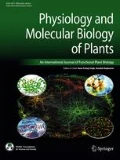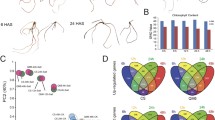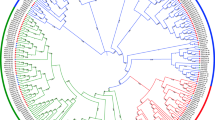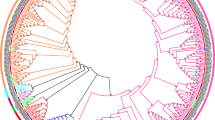Abstract
Salinity is one of the most important problems that adversely affect crops growth, productivity and quality worldwide. Salt Overly Sensitive 1 (SOS1) gene family plays vital roles in plant response to salt stress. Herein, we report the identification of the SOS family in wheat and the exploration of the expression profiles of SOSs under salt stress. Complete genome sequences of T. aestivum were downloaded from Ensembl plant database. Conservation and divergence of TaSOS1 family were conducted by using phylogenetic tree, gene structure and synteny distribution analysis. Expression profiles of TaSOS1s were obtained based on transcriptome and qRT-PCR analysis. Totally, 119 TaSOS1 proteins in wheat were identified at the genome-wide level and classified into three groups. Six motifs were conserved in TaSOS1 gene family. Moreover, 25 TaSOS1 genes had three copies distributing in three sub-genomes (A, B and D). A total of 32, 28 and 29 TaSOS1 genes were located on the sub-genomes A, B and D, respectively. Moreover, there were 19, 12, 6, 7, 28, 5 and 12 genes located on the three homologous of chromosomes 1, 2, 3, 4, 5, 6 and 7, respectively. Two genes were mapped to unattributed scaffolds. The duplication events analysis indicated that tandem repeats contributed to the expansion of the SOS1 family in wheat. Collinearity analysis demonstrated that segmental duplications play an important role in the expansion of SOS1 members. Chromosome 7, 5, 3, and 2 showed collinear relationship. Tissue specific expression pattern analysis revealed that 41 TaSOS1 genes expressed in various tissues, such as root, shoot, leaf, spike and grain. Transcriptomic analysis revealed that 28 and 26 genes were up- and down-regulated under salinity stress, respectively, of which 18 genes were further confirmed by RT-qPCR. The plants with high expression level of these genes displayed higher tolerance to salinity stress, stronger root system, higher Fv/Fm value and water potential. The results could be helpful for further elucidating the molecular mechanism of TaSOS1 related to salt tolerance in wheat and provide a toolkit for improving the salinity tolerance of wheat.








Similar content being viewed by others
References
Abou-Elwafa SF, Büttner B, Chia T, Schulze-Buxloh G, Hohmann U, Mutasa-Göttgens ES, Jung C, Müller AE (2011) Conservation and divergence of autonomous pathway genes in the flowering regulatory network of Beta vulgaris. J Exp Bot 62:3359–3374
Amirbakhtiar N, Ismaili A, Ghaffari MR, Nazarian Firouzabadi F, Shobbar ZS (2019) Transcriptome response of roots to salt stress in a salinity-tolerant bread wheat cultivar. PLoS ONE 14:e0213305
Barakat NAM (2011) Oxidative stress markers and antioxidant potential of wheat treated with phytohormones under salinity stress. J Stress Physiol Biochem 7:250–267
Borrill P, Ramirez-Gonzalez RH, Uauy C (2016) expVIP: a customizable RNA-seq data analysis and visualization platform. Plant Physiol 170:2172–2186
Borsani O, Valpuesta V, Botella MA (2001) Evidence for a role of salicylic acid in the oxidative damage generated by NaCl and osmotic stress in Arabidopsis seedlings. Plant Physiol 126:1024–1030
Chakraborty K, Sairam RK, Bhattacharya RC (2012) Differential expression of salt overly sensitive pathway genes determines salinity stress tolerance in Brassica genotypes. Plant Physiol Bioch 51:90–101
Chen J, Zhong H, Ren J, Zhao W, Man Q, Shang S, Tang X (2019) Genome-wide analysis of the Aquaporin gene family in reptiles. Int J Biol Macromol 126:1093–1098
Chen C, Chen H, Zhang Y, Thomas HR, Frank MH, He Y, Xia R (2020) TBtools-an integrative toolkit developed for interactive analyses of big biological data. Mol Plant 13(8):1194–1202
Cheng C, Zhong Y, Wang Q, Cai Z, Wang D, Li C (2019) Genome-wide identification and gene expression analysis of SOS family genes in tuber mustard (Brassica juncea var. tumida). PLoS ONE 14:e0224672
Che-Othman MH, Jacoby RP, Millar AH, Taylor NL (2020) Wheat mitochondrial respiration shifts from the tricarboxylic acid cycle to the GABA shunt under salt stress. New Phytol 225:1166–1180
Eckhardt U, Grimm B, Hortensteiner S (2004) Recent advances in chlorophyll biosynthesis and breakdown in higher plants. Plant Mol Biol 56:1–14
El Mahi H, Perez-Hormaeche J, De Luca A, Villalta I, Espartero J, Gamez-Arjona F, Fernandez JL, Bundo M, Mendoza I, Mieulet D, Lalanne E, Lee S, Yun D, Guiderdoni E, Aguilar M, Leidi EO, Pardo JM, Quintero FJ (2019) A critical role of sodium flux via the plasma membrane Na+/H+ exchanger SOS1 in the salt tolerance of rice. Plant Physiol 180:1046–1065
Feki K, Quintero FJ, Khoudi H, Leidi EO, Masmoudi K, Pardo JM, Brini F (2014) A constitutively active form of a durum wheat Na+/H+ antiporter SOS1 confers high salt tolerance to transgenic Arabidopsis. Plant Cell Rep 33:277–288
Fu L, Shen Q, Kuang L, Yu J, Wu D, Zhang G (2018) Metabolite profiling and gene expression of Na/K transporter analyses reveal mechanisms of the difference in salt tolerance between barley and rice. Plant Physiol Bioch 130:248–257
Guo B, Wei Y, Xu R, Lin S, Luan H, Lv C, Zhang X, Son X, Xu R (2016) Genome-wide analysis of APETALA2/ethylene-responsive factor (AP2/ERF) gene family in barley (Hordeum vulgare L.). PLoS ONE 11:e0161322
Guo Y, Jiang Q, Hu Z, Sun X, Fan S, Zhang H (2018) Function of the auxin-responsive gene TaSAUR75 under salt and drought stress. Crop J 6:181–190
Hernández JA (2019) Salinity tolerance in plants: trends and perspectives. Int J Mol Sci 20:2408
Howe EA, Sinha R, Schlauch D, Quackenbush J (2011) RNA-Seq analysis in MeV. Bioinformatics 27:3209–3210
Huang L, Kuang L, Wu L, Shen Q, Han Y, Jiang L, Wu D, Zhang G (2020) The HKT transporter HvHKT1; 5 negatively regulates salt tolerance. Plant Physiol 182:584–596
Jadamba C, Kang K, Paek NC, Lee SI, Yoo SC (2020) Overexpression of rice expansin7 (Osexpa7) confers enhanced tolerance to salt stress in rice. Int J Mol Sci 21:454–465
Janda T, Darko E, Shehata S, Kovacs V, Pal M, Szalai G (2016) Salt acclimation processes in wheat. Plant Physiol Bioch 101:68–75
Ji H, Pardo JM, Batelli G, Van Oosten MJ, Bressan RA, Li X (2013) The Salt Overly Sensitive (SOS) pathway, established and emerging roles. Mol Plant 6:275–286
Jia Q, Zheng C, Sun S, Amjad H, Liang K, Lin W (2018) The role of plant cation/proton antiporter gene family in salt tolerance. Biol Plantarum 62:617–629
Jiang W, Pan R, Wu C, Xu L, Abdelaziz ME, Oelmuller R, Zhang W (2020) Piriformospora indica enhances freezing tolerance and post-thaw recovery in Arabidopsis by stimulating the expression of CBF genes. Plant Signal Behav 15:1745472
Jiang W, Pan R, Buitrago S, Wu C, Abdelaziz ME, Oelmüller R, Zhang W (2021) Transcriptome analysis of Arabidopsis reveals freezing-tolerance related genes induced by root endophytic fungus Piriformospora indica. Physiol Mol Biol Pla 27:189–201
Kim T, Seo HD, Hennighausen L, Lee D, Kang K (2018) Octopus-toolkit: a workflow to automate mining of public epigenomic and transcriptomic next-generation sequencing data. Nucleic Acids Res 46:e53–e53
Lethin J, Shakil SSM, Hassan S, Sirijovski N, Topel M, Olsson O, Aronsson H (2020) Development and characterization of an EMS-mutagenized wheat population and identification of salt-tolerant wheat lines. BMC Plant Biol 20:18–28
Liu XS, Feng SJ, Wang MQ, Zhao YN, Cao HW, Rono JK, Yang ZM (2020) OsNHAD is a chloroplast membrane-located transporter required for resistance to salt stress in rice (Oryza sativa). Plant Sci 291:110359
Lohani N, Golicz AA, Singh MB, Bhalla PL (2019) Genome-wide analysis of the Hsf gene family in Brassica oleracea and a comparative analysis of the Hsf gene family in B. oleracea, B. rapa and B. napus. Funct Integr Genomic 19:1–17
Lozano R, Hamblin MT, Prochnik S, Jannink JL (2015) Identification and distribution of the NBS-LRR gene family in the Cassava genome. BMC Genomics 16:360–374
Lv B, Wu Q, Wang A, Li Q, Dong Q, Yang J, Zhao H, Wang X, Chen H, Li CA (2020) WRKY transcription factor, FtWRKY46, from Tartary buckwheat improves salt tolerance in transgenic Arabidopsis thaliana. Plant Physiol Bioch 147:43–53
Ma Y, Wang L, Wang J, Zhong Y, Cheng ZM (2019) Isolation and expression analysis of Salt Overly Sensitive gene family in grapevine (Vitisvinifera) in response to salt and PEG stress. PLoS ONE 14:e0212666
Maher C, Stein L, Ware D (2006) Evolution of Arabidopsis microRNA families through duplication events. Genome Res 16:510–519
Martinez-Atienza J, Jiang X, Garciadeblas B, Mendoza I, Zhu JK, Pardo JM, Quintero FJ (2007) Conservation of the salt overly sensitive pathway in rice. Plant Physiol 143:1001–1012
Maughan PJ, Turner TB, Coleman CE, Elzinga DB, Jellen EN, Morales JA, Udall JA, Fairbank DJ, Bonifacio A (2009) Characterization of salt overly sensitive 1 (SOS1) gene homoeologs in quinoa (Chenopodium quinoa Willd.). Genome 52:647–657
Meng K, Wu Y (2018) Footprints of divergent evolution in two Na+/H+ type antiporter gene families (NHX and SOS1) in the genus Populus. Tree Physiol 38:813–824
Pan R, He D, Xu L, Zhou M, Li C, Wu C, Xu Y, Zhang W (2019) Proteomic analysis reveals response of differential wheat (Triticum aestivum L.) genotypes to oxygen deficiency stress. BMC Genomics 20:1–13
Pan R, Xu Y, Xu L, Zhou M, Jiang W, Wang Q, Zhang W (2020) Methylation changes in response to hypoxic stress in wheat regulated by methyltransferases. Russ J Plant Physiol 67:323–333
Ramirez-Gonzalez RH, Borrill P, Lang D, Harrington S, Brinton J, Venturini L, Davey M, Jacobs J, Van Ex F, Pasha A (2018) The transcriptional landscape of polyploid wheat. Science 361:662–662
Ritchie ME, Phipson B, Wu D, Hu Y, Law CW, Shi W, Smyth GK (2015) limma powers differential expression analyses for RNA-sequencing and microarray studies. Nucleic Acids Res 43:e47
Sathee L, Sairam RK, Chinnusamy V, Jha SK (2015) Differential transcript abundance of salt overly sensitive (SOS) pathway genes is a determinant of salinity stress tolerance of wheat. Acta Physiol Plant 37:169–179
Schilling S, Kennedy A, Pan S, Jermiin LS, Melzer R (2020) Genome-wide analysis of MIKC-type MADS-box genes in wheat: pervasive duplications, functional conservation and putative neofunctionalization. New Phytol 225:511–529
Sharma H, Taneja M, Upadhyay SK (2020) Identification, characterization and expression profiling of cation-proton antiporter superfamily in Triticum aestivum L. and functional analysis of TaNHX4-B. Genomics 112:356–370
Shen Q, Fu L, Su T, Ye L, Huang L, Kuang L, Wu L, Wu D, Chen ZH, Zhang G (2020) Calmodulin HvCaM1 negatively regulates salt tolerance via modulation of HvHKT1s and HvCAMTA4. Plant Physiol 183:1650–1662
Shiu SH, Bleecker AB (2003) Expansion of the receptor-like kinase/Pelle gene family and receptor-like proteins in Arabidopsis. Plant Physiol 132:530–543
Song M, Peng X (2019) Genome-wide identification and characterization of DIR genes in Medicago truncatula. Biochem Genet 57:487–506
Tamura K, Dudley J, Nei M, Kumar S (2007) MEGA4: molecular evolutionary genetics analysis (MEGA) software version 4.0. Mol Biol Evol 24:1596–1599
Xu Y, Magwanga RO, Yang X, Jin D, Cai X, Hou Y, Wei Y, Zhou Z, Wang K, Liu F (2020) Genetic regulatory networks for salt-alkali stress in Gossypium hirsutum with differing morphological characteristics. BMC Genomics 21:1–19
Yang Q, Chen ZZ, Zhou XF, Yin HB, Li X, Xin XF, Hong XH, Gong Z (2009) Overexpression of SOS (Salt Overly Sensitive) genes increase salt tolerance in transgenic Arabidopsis. Mol Plant 2:22–31
Ye CY, Xia X, Yin W (2013) Evolutionary analysis of CBL-interacting protein kinase gene family in plants. Plant Growth Regul 71:49–56
Yousefirad S, Soltanloo H, Ramezanpour SS, Zaynalinezhad K, Shariati V (2018) Salt oversensitivity derived from mutation breeding improves salinity tolerance in barley via ion homeostasis. Biol Plantarum 62:775–785
Zhang S, Tong Y, Li Y, Cheng ZM, Zhong Y (2019a) Genome-wide identification of the HKT genes in five Rosaceae species and expression analysis of HKT genes in response to salt-stress in Fragaria vesca. Genes Genom 41:325–336
Zhang W, Wang S, Yu F, Tang J, Shan X, Bao K, Yu L, Wang H, Fei Z, Li J (2019b) Genome-wide characterization and expression profiling of SWEET genes in cabbage (Brassica oleracea var. capitata L.) reveal their roles in chilling and clubroot disease responses. BMC Genomics 20:93–101
Zhang T, Shi Z, Zhang X, Zheng S, Wang J, Mo J (2020) Alleviating effects of exogenous melatonin on salt stress in cucumber. Sci Hortic-Amsterdam 262:109070
Zhao C, William D, Sandhu D (2020) Isolation and characterization of salt overly sensitive family genes in spinach. Physiol Plantarum. https://doi.org/10.1111/ppl.13125
Zhu M, Shabala L, Cuin TA, Huang X, Zhou M, Munns R, Shabala S (2016) Nax loci affect SOS1-like Na+/H+ exchanger expression and activity in wheat. J Exp Bot 67:835–844
Acknowledgements
We appreciate the financial support from the National Key R&D Program of China (2016YFD0102101) and the Hubei Collaborative Innovation Center for Grain Industry. We also appreciate the discussion and comments about the draft from Rong Zeng, Banda Milca Medison, Hongyu Xia, and anonymous reviewers for their critical reading and invaluable comments and suggestions on the manuscript.
Author information
Authors and Affiliations
Corresponding author
Ethics declarations
Conflict of interest
There is no conflict of interests.
Additional information
Publisher's Note
Springer Nature remains neutral with regard to jurisdictional claims in published maps and institutional affiliations.
Supplementary Information
Below is the link to the electronic supplementary material.
Rights and permissions
About this article
Cite this article
Jiang, W., Pan, R., Buitrago, S. et al. Conservation and divergence of the TaSOS1 gene family in salt stress response in wheat (Triticum aestivum L.). Physiol Mol Biol Plants 27, 1245–1260 (2021). https://doi.org/10.1007/s12298-021-01009-y
Received:
Revised:
Accepted:
Published:
Issue Date:
DOI: https://doi.org/10.1007/s12298-021-01009-y




